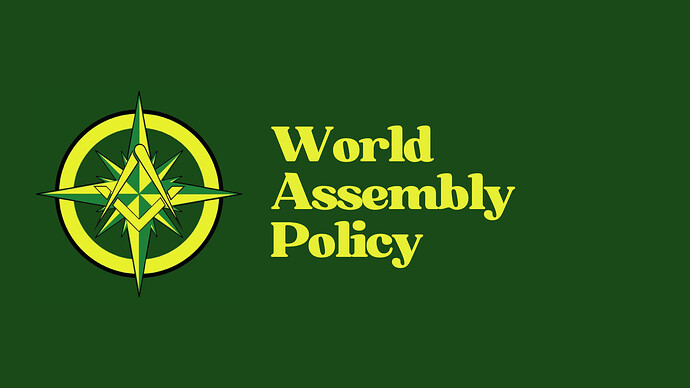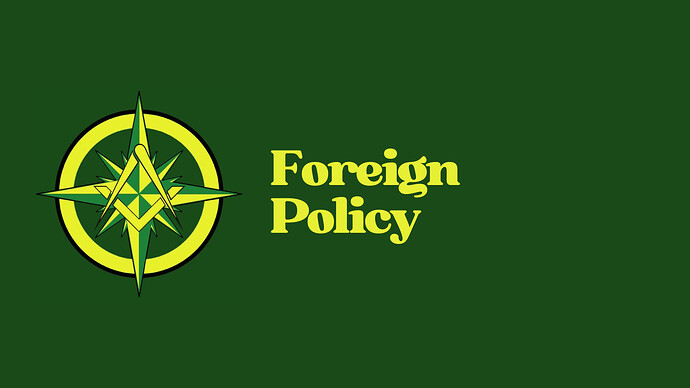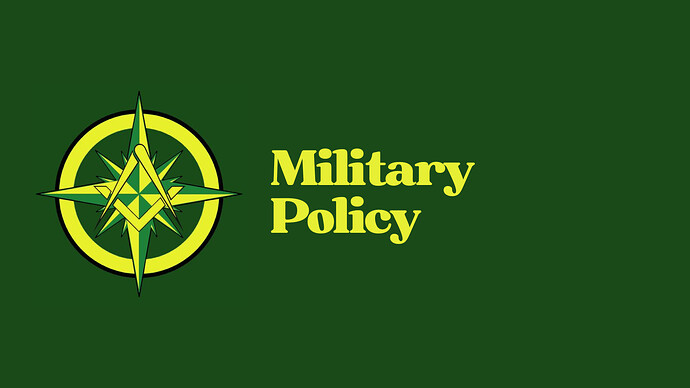The former Delegate took to the stage like a fish to water. His white poet shirt stood out against his crimson vest and blazer – the colors of Lerasi, his lost empire. Behind him, his campaign slogan dominated the screen – “Action. Accountability. Aivintis.” His ornate Vizier’s sword hung comfortably from his hip and despite the clashing colors, his medal from the Order of the Golden Ocelot hung proudly from his neck. Even without a microphone, his voice filled the arena.
My fellow East Pacificans. It is an honor to be before you today once again seeking the Delegacy of The East Pacific. It was in this month, three years ago, that I was first entrusted with the highest office in the land. I was younger then, more naïve and less experienced. Now, I come to you after proving myself as a leader across this region. I come to you because I believe it is my duty to do my part in building a new era of East Pacifican politics.
First, I’d like to touch on my qualifications for this office. I don’t often indulge in tooting my own horn, but I think it’s important to let you all know what I have to offer, so please permit this quick overview of my career. I’ve written 56 EPNS articles, more than any other, as well as 26 UTEP essays, and 62 legislative proposals. I’ve negotiated 10 treaties, authored 4 WA resolutions, processed 47 citizenship applications, alterations, and audits, answered 11 Judicial Reviews and Advisory Questions, and handed down 19 Executive Orders.
I have held four Minister positions – two of which I’ve held twice – and have five years of cabinet and foreign council experience under my belt. I have fought for sensibility, unity, and the underdog for six years – during the coup, the residents’ rights debate, the Concrisis, and more. I am the first and only person to serve as a branch leader for all four branches of government and I bring a cosmopolitan view. I have years of UCR experience in executive, legislative, judicial, and security branches on top of my GCR experience in the same.
But enough talking about my past. Let’s talk about my future and how I would serve you once again as Delegate.
The lit screen behind him shifted, revealing the next slide of his presentation. The format of the title slide was followed exactly, except the campaign slogan was replaced with a new one: “Leadership Philosophy.”
I am here to support my Ministers. As Delegate, I intend to basically serve as everyone’s Deputy Minister. They set the agenda, they do their job largely independent of me, but I lend a hand. I’ll contribute monthly to UTEP and EPNS, join in on planning cultural events, and help with recruitment efforts. Part of why so many Ministries tend to struggle so much is because the Minister’s all on their own. The Delegate’s job is to make sure no Ministers are alone in this.
As both servant and supervisor, it is very important to maintain a strong communication between me and the ministers. To that end, I want to implement monthly reports where Ministers share their goals for the next month and their progress on last month’s goals. That way, we can have open, regular dialogue on how I can best support them in those goals and what adjustments we may need to make together based on my campaign platform or any changing circumstances.
As their deputy and as the the face of the executive, I think I also need to play a strong role in recruiting. Something that contributed to my burnout as Chancellor and Editor-in-Chief was the burden placed on me with little to no institutional support. As Delegate, I want to make sure no Minister experiences that. I think one person should personally DM every single new applicant in the Join the Executive channel, and I think the Minister and I should work together on measurable goals for each staffer, such as one news article or UTEP essay a month, something humble but helpful.
The monthly check-ins with my Ministers will serve an additional purpose in informing my Delegate’s Update in EPNS. This currently exists, but in a very limited form. Anyone who’s seen my work in EPNS knows that I do not hold back on detail – my own Grand Vizier Address was often longer than the Delegate’s Update in past EPNS editions – and more detail means more transparency from the Executive government. I would also encourage Ministers to write their own monthly articles if they’d like. Arleat did a good job at this as Secretary of Endorsement Affairs and I occasionally wrote in EPNS about UTEP, so there’s some precedent for this.
In the Cabinet, I also value diverse perspectives. I don’t want any situation where I find myself in an echo chamber. Consensus demands dissent. I wish to create unique adviser roles to fill with representatives of different ideologies and ideas on top of keeping meritocracy at the core of the Minister appointment system. For example, a Vizier as a security adviser, a Magister as a legislative adviser, a roleplay adviser from Valsora and/or Urth, and any other perspectives I believe are necessary to a holistic, consensus-based approach to leadership.
The next slide of his presentation revealed itself as the Vizier-Magister ran a hand through his hair and took a quick sip of water. The slide read, “World Assembly Policy.”
When it comes to the World Assembly, I believe we should be taking different approaches to the General Assembly and Security Council. We suffer from a lack of interest in the World Assembly as well as a strong shortage of interested staffing. For this reason, we tend not to see much activity in the WA Commission and therefore very few and very uninformed voters in our polls. For that reason, I support the shift Cretox has been pushing to return to a more Council-based decision-making format, with more involved conversation and more exclusive voting.
However, I think Security Council matters should remain up to the Delegate. Personally, I have a lot of WA experience, as a three-time SC author, a one-time GA co-author, and a thirteen-time IFV author for Commissioner Albrook. I know the standards and rules for proposals, I know what a good one looks like, and I know what a bad one looks like. More importantly, my five-year experience with Foreign Affairs allows me to handle sensitive NSGP proposals with a balanced perspective.
Due to all of this, I would commit to a split policy on the WA. On GA proposals, a council will discuss and vote upon each proposal and submit a recommendation that I will always follow. On SC proposals, the Cabinet will take the place of this council, where my WA Commissioner/Minister, FA Minister, and any relevant advisers will help me choose whether or not to support an SC Resolution. I will prioritize voting in favor of well-written C/Cs for members of allied and partnered regions, because I believe we should treat regions as we’d like to be treated, as simple as that.
I would also want to talk to interested WA staffers about if they’d ever like to author resolutions themselves. Between me, Gem, Cretox, Wallenburg, and AMOM, we have a very eclectic mix of experienced resolution authors in TEP, who I want to mobilize as an advisory force to support a strong TEP presence in the WA. I never felt much support from my region when I was authoring resolutions, so a formal advice network and the full supportive weight of our Foreign Affairs Ministry can be transformative in an up-and-coming author’s career. There’s a lot of TEPers in need of recognition and I want to make them happen – with a lot of support and no stamps needed.
The next slide comes into view, reading, “Foreign Policy.”
I’d like to start off my FA section with an affirmation that I am committed to East Pacifican unalignment. There was a recent incident where an ally of ours got entangled with another region, kicking off a huge scandal, and I was not satisfied with internal discussions about it. Let me be clear – it is not The East Pacific’s place to interfere in the affairs and squabbles of our allies OR our ‘enemies’ and I will preserve our unalignment in the military sense as well as in a political sense.
I would also like to see some progress with regions who we may not have very positive relations with. In my term, I reached out to the West Pacific for reconciliation, two years after our treaty broke down. Now, after another three years, I’d like to reach out again. I’d also like to pursue relations with the Outback, which currently has a lot of membership overlap with the West. I plan to continue working with the Plains of Perdition and consider further talks with the League & Concord and The North Pacific to build back some bridges.
Moving from policy to structure, I wish to reevaluate the Ministry of Foreign Affairs. In recent administrations, the Delegate and Minister have both been very top-down leaders, which is absolutely their right, but has cheapened the strength of the FA Council as a decision-making institution. Once upon a time, consensus from this Council was as strong as the word of a Delegate, and the Delegate followed their expert advice. Now, that’s changed. However, we’ve also seen downturns in Council activity and a very different Executive environment to when the Council was initially developed.
I wish to merge the FA Council as it stands with Cabinet, cutting down on members if needed. This means appointing a few Foreign Affairs Advisers out of existing Councilors, but also allowing different perspectives to chime in – Culture, World Assembly, Military, etc. The FA Council, in years past, has pretty much acted like this, simply in a different channel and with more members, but since membership is declining, I think this change can be sustainable. It was also born in a period where we had a cabinet leak, which is no longer a concern, so I think this could bring new vitality to strong FA decisions.
I also want to reintroduce the FA Watch. The Foreign Affairs Minister abolished this channel out of concerns that ‘just’ talking about interregional developments didn’t bring value. However, I disagree. I think sharing opinions is how we all learn from each other and build a democratic culture. Activity is how we measure government success. It’s also a great, low-effort opportunity to train future leaders. Certain low-priority decisions can also be relegated to the Watch – as has been planned in the past – to democratize a lot of our diplomatic process in a controlled and effective manner.
The presentation shifted again, the next slide reads, “Military Policy.”
Moving to the realm of EPSA, I’m going to admit that my stance has changed recently. If you asked me a few months ago what I wanted to see out of EPSA I would have said that I want to reduce it to a piler force for allied Delegate transitions and defenses as well as antifascist griefing raids. That’s it. However, I’ve recently seen a promising shift that gives me hope that EPSA can return into a world-class military. I am therefore willing to put the time and resources into pushing that.
I want to work with EPSA Commanders on the idea of contracting Viziers to learn how to trigger operations. This is a great way to keep WA-locked veterans involved in the military, but obviously it still requires updaters. I have long held the belief that Valsorans are our biggest pool for recruitment to EPSA, given their military inclinations in roleplay, and I want to work with my Admiral to pursue that and bring a few RMBers into EPSA. We did it before and we can do it again. New soldiers can also chat about FA in the Watch and get introduced to the government through R/D.
While I’m reaffirming our core principles of unalignment, let me also reaffirm some of our other core principles: EPSA will play a very prominent role in griefing problematic regions under my administration, but will not participate in the griefing of innocent regions. We will raid, yes, and keep tagging regions, but we will not upend communities that have done nothing to deserve it. This may block some avenues of working with raider regions, but if it blocks out an organization entirely, then that’s not an organization we should be working with anyway.
He paused for emphasis, feeling energized by the crowd. the next slide reads, “Cultural Initiatives.”
I think the problem with a lot of cultural campaigns is that they get too bold too quickly, so I want to keep it simple. I want to host one Hunger Games a month – which we already do – and then one additional game night each month. Two events a month may seem like very little compared to one or two a week, but it’s still really good comparatively and more importantly, it’s achievable. We had the game night with Lazarus in May, and I do want to see more partnered events even outside of Hunger Games, but we can also do games in the Cafe or the Urth server.
I’d also like to host another Diplomacy game. This is something I’ve wanted to do for some time since Millenhaal introduced TEP to it. I think it fits NS vibes really well and with enough effort I can see it becoming a regular thing. The Diplomacy hobby community is also really significant, so bringing TEP into those spaces can be an easy first step to game expansion – perhaps, after a year or two of working hard and learning the game, TEP can have a presence hosting Diplomacy tournaments that bring interested players to us.
I’ll also put together a task force on exploring other options for game expansion. We’ve been talking about this idea for years and seen no progress on it, so I want to create a channel or thread on discord where any member of the community can participate in discussions on this big change for our future. They can suggest games, Culture can host events where people learn those games, with EPNS or UTEP creating guides, and then the Task Force can discuss how we can extend our community through the use of those games.
But I don’t want to get too ahead of myself. If we set simple short-term goals, we can accomplish them, and we can build off of them slowly and steadily into something great. When I was last Delegate, we didn’t even do Hunger Games, but now we host them constantly and always pull a big crowd with them. We have to just act deliberately. This is also a great way of managing low-level staff. When I was Minister of Culture in 2020, I had a lot of ideas, but not a lot of volunteers, and a lot of things fell through. Reasonable, measurable goals and tasks are how we engage our staff, simple as that.
The presentation moved forward, and the penultimate slide read, “Other Ministries.” The statesman could see the attention of the audience waning.
Alright, we’re almost done, don’t worry.
He smiled and looked back at the screen.
Okay, I know that’s vague, but here’s the deal: Endorsement Affairs, Recruitment, and Outreach are not the flashiest Ministries, and my thoughts on them are pretty simple, so I’ll keep them all to one little section before sharing my closing thoughts.
The Ministry of Endorsement Affairs does not need to exist. As a Vizier, I am a very strong endotarter, and I will keep that going as Delegate. I can make my own dispatches for endorsing me, and EPPS can work to support Vizier endorsements. I don’t see the need for an Executive Ministry solely devoted to this activity, and so I do plan to abolish Endorsement Affairs upon taking office. It also frees up manpower for other Ministries which desperately need it. I’ll note that I do plan on appointing a security adviser who can add to Cabinet discussions on these issues nevertheless.
The Ministry of Outreach, similarly, need not exist. In days past, we had Forum RP and RMB RP Representatives in the Cabinet to share their thoughts on major decisions that may affect each community and brainstorm ways to get them involved. Now, it’s moved to the task of a single office, which has a history of ignoring one subcommunity or another. I want to bring in advisers from both communities to replace the Ministry of Outreach and help us maintain strong representation without risking overcorrection or limited perspectives. It also, once more, frees up dedicated players to work on other tasks, like:
Recruitment! This Ministry is so very important since the Frontier and Stronghold update. I want to appoint a Minister that will make a quick guide on how to recruit, and then I want to have this person work on getting Magisters, Viziers, EPPS Officers, Citizenship Officers, Arbiters, and Ministers all involved in the task of sending manual recruitment telegrams. Especially while boycotting stamps we need to make sure that we have the knowhow and the hands on deck to ensure that The East Pacific doesn’t fall behind compared to other regions. We have a lot of opportunity and we need to be sharing that with prospective residents.
He left no segue or pause before the final slide of his presentation, the one reading “Closing Thoughts,” appeared behind him. Many gathered in Rilannon that day would only pay attention now, so he had to make it count.
Now for what you’ve all been waiting for, a quick overview and summary of how I can and will serve this region as Delegate once more. Here’s the low-down:
-
I plan to act as everyone’s Deputy Minister, picking up tasks that need doing to ease the burden of the entire Cabinet and support everyone in achieving our goals, using simple monthly reports to stay connected and inform a more detailed Delegate’s Update in EPNS.
-
I plan to implement a split policy on the World Assembly that makes Cabinet decisions on the Security Council and community decisions on the General Assembly, while creating an advising force to support WA authorship.
-
I plan to merge the FA Council with the Cabinet through the appointment of multiple FA Advisers, and bring every single Executive perspective into foreign policy, as well as other specialized advisers, like security.
-
I plan to train Viziers in R/D triggering to support EPSA Command and recruit RMBers to the Armada in order to capitalize on a clear interest in military affairs and help support the next evolution of EPSA.
-
I plan to host two events per month, including Hunger Games and others like Diplomacy, that can serve as a springboard for game expansion, which will see its own dedicated task force
-
I plan to devolve the Ministry of Outreach into separate FRP and RMBRP Advising roles and further limit Executive bloat by abolishing Endorsement Affairs, moving staff to more important roles such as increasing Recruitment with detailed guides.
Ultimately, I plan to serve you. Thank you so much for enduring this long speech. I hope I can count on your support to revolutionize the Executive government, but any vote’s a good vote, so don’t forget to turn out next week when polls open. Remember, my fellow East Pacificans: Vote for Action. Vote for Accountability. Vote for Aivintis.







